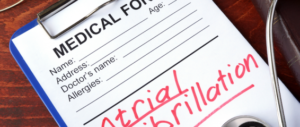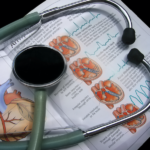 When we are younger we feel immortal, like nothing can touch us and we will live forever. Our health is generally good. The thing is, health conditions like Afib (atrial fibrillation) can strike at just about any age.
When we are younger we feel immortal, like nothing can touch us and we will live forever. Our health is generally good. The thing is, health conditions like Afib (atrial fibrillation) can strike at just about any age.
What is Afib?
Atrial Fibrillation, is a condition many of us remain blissfully unaware of. It is sometimes referred to for short as Afib. It is an irregular heartbeat. Afib is the most common type of arrhythmia. Even if you are young and in good health, you can still present with Afib due to stress.
Other risk factors may include certain medications, heavy alcohol consumption, or training as an endurance athlete, or structural heart defects.
When no risk factors exist, a sleep study may be conducted as sleep apnea can be a causing culprit. The fact is that with Afib, the cause isn’t always discovered. Even with an unknown cause, unlike most things in life, there is still a possible solution. Having an ablation procedure done which knocks out the part of the heart which keeps having the episodes.
The term Lone Afib has been used for more than half a century and is used to describe an atrial fibrillation of unknown origin.
Long-term and untreated Afib wears out your heart and entire cardiovascular system. This puts you at a higher risk of stroke. In many people, it will also cause chest pain, heart attack or even heart failure. If you have signs of Atrial Fibrillation it’s important to see your doctor right away
Symptoms can include:
Rapid Heartbeat
Shortness of breath
Heart palpitations
Exhaustion without exertion
Exhaustion during workouts
Irregular heartbeat
Confusion
Dizziness
Doctors diagnose atrial fibrillation using family and individual medical history as well as a physical exam, and an electrocardiogram. Treatments can include select medicines and procedures designed to restore normal rhythm.
Heart issues are among the most disturbing to deal with after all your heart is the core of your being. If you feel the above symptoms and they do not subside with rest, relaxation, or attempts to de-stress it is important to seek medical advice.
If you live in the Tampa Bay area and are looking for a great cardiology team, please call us at 813-975-2800. Patient comfort and care are a priority here at Tampa Cardiovascular Associates. We look forward to talking with you. www.tampacardio.com.


 Stress has a horribly negative effect on your body.
Stress has a horribly negative effect on your body. 
 If you are dealing with varicose veins you will want to see a qualified Vein Specialist for a proper diagnosis in order to know what your best options are for treatment.
If you are dealing with varicose veins you will want to see a qualified Vein Specialist for a proper diagnosis in order to know what your best options are for treatment. 

